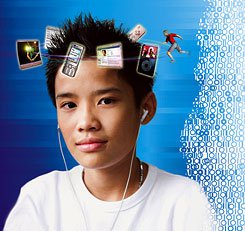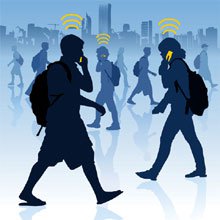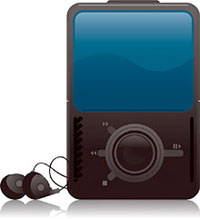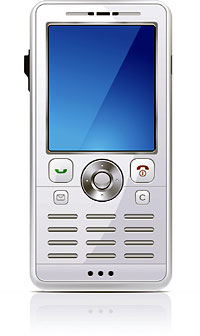The 21st-Century Digital Learner
How tech-obsessed iKids would improve our schools.

I give presentations to educators at every level, all around the world. All of the teachers are earnestly trying to adapt their educational system to the twenty-first century. During my talks, however, I typically look out at oceans of white hair. Never -- I can't even say rarely -- is a kid in sight or invited to the party.
It is a measure of the malaise of our educational system that these old folk -- smart and experienced as they may be -- think they can, by themselves and without the input of the people they're trying to teach, design the future of education.
One of the strangest things in this age of young people's empowerment is how little input our students have into their own education and its future. Kids who out of school control large sums of money and have huge choices on how they spend it have almost no choices at all about how they are educated -- they are, for the most part, just herded into classrooms and told what to do and when to do it. Unlike in the corporate world, where businesses spend tens of millions researching what their consumers really want, when it comes to how we structure and organize our kids' education, we generally don't make the slightest attempt to listen to, or even care, what students think about how they are taught.
This is unacceptable and untenable. It's also dangerous. We treat our students the way we treated women before suffrage -- their opinions have no weight. But just as we now insist that women have an equal voice in politics, work, and other domains, we will, I predict, begin accepting and insisting that students have an equal voice in their own education. Or else our students will drop out (as they are doing), shoot at us (ditto), sue us, riot, or worse.
So, whenever and wherever I speak, I do my best to bring my own students to the meetings. I ask my hosts to select a panel of a half-dozen or so kids of different grade levels, genders, and abilities to talk with me and the audience. I ask only that the students be articulate and willing to speak their minds in front of an audience of educators. Some groups embrace the idea enthusiastically; others are wary. A few tell me they "just can't find" kids -- and this, from teachers -- or cite some rule that prevents kids from being there. Nonetheless, I persist, both hoping for an effective panel and believing that the group will provide a model for integrating student input about their education into schooling and planning.

What do I find? Almost all the groups are pleased and surprised by the result. In fact, the student panels are generally the highlight of my appearances. This comment after a discussion in front of the West Virginia Department of Education is typical: "It was the best thing we've ever done."
By design, I typically don't meet the students until just before I speak, and my only instructions are to "tell the truth as much as you feel comfortable." I never know what the kids are going to say. One colleague told me, "That's really brave." I don't see it that way. I see the panels as an opportunity to hear what the students think -- whatever that may be. Listening to our students is always interesting and worthwhile, whether the kids are speaking their own minds (almost always the case) or whether they are channeling careful coaching they have received in advance from their teachers and parents (which happens occasionally, and is always quite obvious).
My approach, when conducting these panels, is to first ask the students a few setup questions:
- What experiences in school really engaged you?
- How do you use technology in school as opposed to outside of school?
- What are your pet peeves?
The kids are allowed to pass if they don't want to answer, which takes some of the pressure off, and the audience is invited to join in later.
Every one of these panels is unique, but certain common threads emerge: The students generally express a variety of feelings -- gratitude for the good teachers they have, and frustration with the greater number they find not so good. They are full of ideas but often skeptical that things are going to change much.
So why am I, at the ripe old age of sixty-two, the person who gives students a voice? Perhaps it's because the students agree with what I have to say. (They usually hear my talk before the panel.) Perhaps it's because I communicate somehow to the kids that I truly respect their opinions. It turns out that not everyone can moderate these panels successfully, especially at first. It takes a willingness to accept whatever is said -- good or bad, agree or disagree. But it is important for educators to try, because they so rarely converse with their kids about how they want to learn.
When I first started doing these panels, I regret, I took no notes. But over the past year I have tried to write down as many of the comments as possible. I have heard some enormously insightful comments from the students, particularly about the differences between students and their teachers. "There is so much difference between how students think and how teachers think," offered a female student in Florida. A young man commented, "You think of technology as a tool. We think of it as a foundation -- it's at the basis of everything we do."
"A lot of teachers make a PowerPoint and they think they're so awesome," said a girl in Florida. "But it's just like writing on the blackboard." A student in Albany, New York, pleaded the case for using technology in the classroom: "If it's the way we want to learn, and the way we can learn, you should let us do it."
One teacher queried, "Do computers cut you off from the world?" Not at all, said an excited student: "We share with others and get help. Technology helps -- it strengthens interactions so we can always stay in touch and play with other people. I've never gone a day without talking to my friends online."
One California high school served up a dose of common sense: "Kids grew up around computers. They love them. Their computers are their second teachers at home." A student in West Virginia offered this nugget: "If I were using simulation in school, that would be the sweetest thing ever!"

Blah, Blah, Blah
OK, so kids love computers. They all agree on that. There's another thing they agree on: No matter where I go in the world -- the United States, Canada, Europe, Asia, Australia, or New Zealand -- students are mind-numbingly bored in class. Listen up:
"I'm bored 99 percent of the time." (California)
"School is really, really boring." (Virginia)
"We are so bored." (Texas)
"Engage us more." (Texas)
"[My teachers] bore me so much I don't pay attention." (Detroit)
"Pointless. I'm engaged in two out of my seven classes." (Florida)
"The disconnect between what students want and what they're receiving is significant," said Julie Evans, CEO of Project Tomorrow, which tracks youth culture. "Student frustration is rising."
I've heard some teachers claim that this is nothing new. Kids have always been bored in school. But I think now it's different. Some of the boredom, of course, comes from the contrast with the more engaging learning opportunities kids have outside of school. Others blame it on today's "continuous partial attention" (CPA), a term coined by Linda Stone, who researches trends and their consumer implications. Stone describes CPA as the need "to be a live node on the network," continually text messaging, checking the cell phone, and jumping on email. "It is an always-on, anywhere, anytime, anyplace behavior that involves an artificial sense of constant crisis," she writes. "We pay continuous partial attention in an effort not to miss anything."
CPA differs from multitasking, which is motivated by a desire to be more efficient and typically involves tasks that demand little cognitive processing. We file and copy while we're talking on the phone and checking email, for instance.
Is this really new? I don't think so. In fact, I think it has always been the case. Excluding emergencies, or other experiences in which one's adrenaline is flowing, humans typically always have multiple things on their minds. Still others attribute the boredom to attention deficit hyperactivity disorder, but the T-shirt I recently saw a kid wearing in Rockefeller Center belies this theory: "It's Not Attention Deficit -- I'm Just Not Listening!"
It's none of the above. If you believe the opinions of kids around the world (and you ignore them at your peril), the source of the problem is abundantly clear, and it's this: Today's kids hate being talked at. They hate when teaching is simply telling. They hate lectures and tune them out.
I've heard teachers argue that some subjects and topics need to have lectures, but, in truth, this is only a justification for the failure of those teachers to change how they teach. It is absolutely not true; there are other ways, in any discipline, to get students to learn exactly the same material without lectures -- as well as without worksheets, something else the kids tell us they really hate.
There are better ways to help them learn, and students expect us, as the adults in the room, to know how to use them. They say, for example, "If you made it more interesting we would respond better." And, "If you give us a goal to get to, we'll get there."
Students universally tell us they prefer dealing with questions rather than answers, sharing their opinions, participating in group projects, working with real-world issues and people, and having teachers who talk to them as equals rather than as inferiors. Hopefully, this is useful information for teachers and other educators -- and it is important that educators realize just how universal these opinions are.

"My Brain Is Exploding . . ."
For me, though, the best part of the student panels is always hearing the kids' answers to my final question. I ask about their experience that day and whether their soapbox proved useful. "How do you like being able to talk to your teachers and supervisors about your learning?" I ask. I truly love their answers:
"I like the fact that we become equals. Students do not get the opportunity that often to share their ideas. If students and teachers could collaborate, a lot more would get done." (Anaheim, California)
"A lot of students care -- you just don't realize it." (Poway, California)
"Most of the time, the teachers are talking and I want to go to sleep. But now my brain is exploding." (Poway, California)
"Don't let this be a onetime thing." (Poway, California)
"I think it's important that you take time to see what we feel." (West Virginia)
"Now you know what we think and how we feel. Hopefully, that will go to the heart." (Texas)
"I waited twelve years for this." (Texas)
"I wouldn't have believed it if I hadn't seen it!" (Texas)
"As a general rule, you don't hear from kids unless they've gotten into trouble." (Anaheim, California)
"Both groups [teachers and students] can learn from each other." (Anaheim, California)
"If you don't talk to us, you have no idea what we're thinking." (Hawaii)
Clearly, the kids find it valuable to share with their educators their opinions on how they want to learn. Although skeptical, they hope those teachers and administrators who are trying to improve their education think so, too, and listen carefully to what the students have to say. Again, quoting the kids:
"It would be good if teachers have this conversation with us on the first day. But often, they don't change anything." (Texas)
"I hope this didn't just go in one ear and out the other." (Texas)
Have there been any quantifiable results in terms of real changes to the students' daily lives? It's hard (and probably early) to tell, although I do know for certain that the panels have had an influence on the administrators in the audiences. Many superintendents have invited me back to do the talks and panels again for their principals and teachers. Australian administrators distributed a three-CD set of the kids' discussions to every teacher they supervise. My great hope is that, once modeled, these types of conversations will be repeated frequently in our schools, in the United States, and around the world.
Bottom-Up Input
After hosting dozens of these conversations, I realize one thing: We just don't listen enough to our students. The tradition in education has been not to ask the students what they think or want, but rather for adult educators to design the system and curriculum by themselves, using their "superior" knowledge and experience.
But this approach no longer works. Not that the inmates should run the asylum, but as twenty-first-century leaders in business, politics, and even the military are finding out, for any system to work successfully in these times, we must combine top-down directives with bottom-up input. As the students have told me on more than one occasion, "We hope educators take our opinions into account and actually do something!" Until we do, their education will not be the best we can offer.